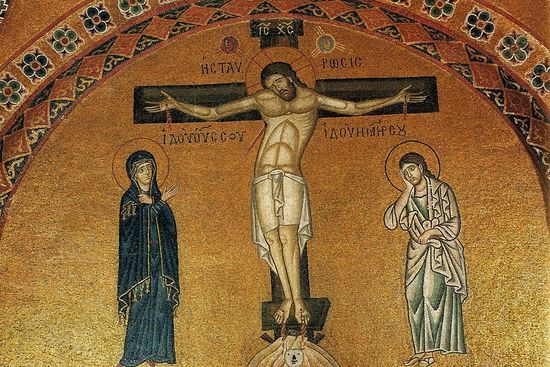Good Friday: Abbot Paul's Homily
No one suffers alone, for whatever form our sufferings take, God is with us and, in Christ, God suffers with us.
“It is not as if we had a high priest who was incapable of feeling our weaknesses with us. Let us be confident, then, in approaching the throne of grace, that we shall have mercy from him and find grace when we are in need of help.” These words from the Letter to the Hebrews sum up the message of the Gospel and the essential truth of the Christian faith. They place the reality of our lives in the context of God’s plan for our salvation. When we consider the extent of human suffering, it’s not easy to believe in a loving God, a God who wants life and not death. Even when our faith is strong, we struggle to believe. It’s not easy to accept a God who can allow so much suffering. The story of Christ’s Passion is one of pain and rejection, of physical and spiritual anguish. It doesn’t explain or take away suffering or its causes, but it does say something very important about God. In the Mystery of the Incarnation, God enters into our world to share fully the tragedy of human life.
Julian of Norwich writes of a conversation she once had with the Lord Jesus, which sheds light on the interplay between our suffering and sin and the Passion of Christ. “Our good Lord Jesus Christ said, ‘Are you well satisfied with my suffering for you?’ ‘Yes, thank you, good Lord,’ I replied. ‘Yes, good Lord, bless you.’ And the kind Lord Jesus said, ‘If you are satisfied, I am satisfied too. It gives me greater happiness and joy and, indeed, eternal delight ever to have suffered for you. If I could possibly have suffered more, I would have done so.’ And here I saw that the love, which made him suffer, is as much greater than his pain as heaven is greater than earth. It was because of this love he said, ‘If I could possibly have suffered more, I would have done so.’” Christ suffered and died for love of us all. St Catherine of Siena says, “Nails were not enough to hold God-and-man fastened to the cross, had not love held him there.”
No one suffers alone, for whatever form our sufferings take, God is with us and, in Christ, God suffers with us. Again in the Letter to the Hebrews we read, “It is not as if we had a high priest who was incapable of feeling our sufferings. During his life on earth, he offered prayer and entreaty, aloud and in silent tears, to the one who had the power to save him out of death, and he submitted so humbly that his prayer was heard. Even so, it is in suffering that, although he was Son, he learnt to obey.” It is only in suffering that we come to see and know the living God. He is in our wounds, the open wounds of our suffering and pain, the wounds of the Risen Christ. The prophet Isaiah said, “Ours were the sufferings he bore, ours the sorrows he carried. He was pierced through for our faults, crushed for our sins. On him lies a punishment that brings us peace, and through his wounds we are healed.”
On Easter night, in the Upper Room, Jesus greets his disciples saying, “Peace be with you,” then shows them his hands and his side, the hands that had been nailed to the cross, the side the soldier’s lance had pierced and from which had come forth blood and water. The wounds of Christ will remain open until the Last Day when he, the victor over sin and death, will hand over to his Father the whole of creation redeemed in his blood and renewed by the Holy Spirit. As members of the Body of Christ, we play our part in the work of redemption. Suffering is not futile. All suffering is redemptive and leads to salvation, all suffering has meaning and purpose and is a channel of grace, if we see God in the suffering, in the horror and the pain.
Last night we sang, “We must glory in
the cross of our Lord Jesus Christ; he is our salvation, our life and
resurrection.” Today we sing, “This is the wood of the cross, on which hung the
Saviour of the world.” May God in his mercy help us grow in faith so that we
really experience in our sufferings the Cross and Resurrection of Jesus. Amen.










